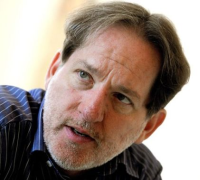Dr. László Baán
 Dr. László Baán is the Head of Museum of Fine Arts from 2004. Under his leadership the insitution had renovated and became one of singed European museum because of the exhibitions – like El Greco, Velazquez, Goya, Van Gogh in Budapest, From Botticelli to Tiziano - attractives more hundred thousands peoples and succesful introduction in foreign countries: exhibition in Royal Academy of London, in Museum Puskin of Moscow, in National Art Center of Tokyo - and modern communication skills.
Dr. László Baán is the Head of Museum of Fine Arts from 2004. Under his leadership the insitution had renovated and became one of singed European museum because of the exhibitions – like El Greco, Velazquez, Goya, Van Gogh in Budapest, From Botticelli to Tiziano - attractives more hundred thousands peoples and succesful introduction in foreign countries: exhibition in Royal Academy of London, in Museum Puskin of Moscow, in National Art Center of Tokyo - and modern communication skills.
Moderator
Dr. György Bőgel
Professor of Management, CEU Business School
 9 books and more than hunder articles dedicated in his name alone or with co- author in English and in Hungarian. „Inspection: studies and notes of infocomunication world" be published in HVG publishing house, „Managing then and now" co- author with János Tomka be published in 2010 by National Textbook Publishing House. In such sectors and companies Mr. Bőgel experienced as consultant and instructor. In last 8 years he is active blogger.
9 books and more than hunder articles dedicated in his name alone or with co- author in English and in Hungarian. „Inspection: studies and notes of infocomunication world" be published in HVG publishing house, „Managing then and now" co- author with János Tomka be published in 2010 by National Textbook Publishing House. In such sectors and companies Mr. Bőgel experienced as consultant and instructor. In last 8 years he is active blogger.
After university degree of economics worked as advisor of business management consultant than university lecturer. In the same time managed international studies of developing several years.
In 2001 György Bőgel worked as strategy consultant for KFKI Informatics LTD. and in this year Mr. Bőgel got an invitation to be external professor of CEU Business School.
2013 Pulse of the Profession™:
the High Cost of Low Performance
Presenter: Zbigniew J. Traczyk, MSc, MBa, PMP, PMI Secretary/Treasurer, Chair Performance Oversight Committee, 2013 Board of Directors

Member of the PMI Board will deliver keynote presentation on the 2013 Pulse of the Profession™: The High Cost of Low Performance:
"With billions of dollars dependent upon the success and failure of projects, it is no wonder organizations are striving to manage projects more efficiently. Not only is it crucial for organizations to manage their projects, programs and portfolios effectively and strategically, but poor execution can lead organizations down a path to peril.
PMI's Pulse of the Profession™ finds that performance in meeting project goals, timelines and budgets significantly impacts an organization's ability to thrive. Organizations with high performance in these three measures risk only US$20 million per US$1 billion spent, while their less successful peers jeopardize US$280 million for the same US$1 billion spent. That 14 times divide could make the difference between an organization sustaining or discontinuing operations."
He will salute the winner of the Project Manager of 2013 in Hungary Award and the 10 years old PMI Budapest Chapter, he will say thank you for volunteers of the chapter and announce the local version of the PMBOK Guide 5th Edition.
Details...Transition of our profession: from project management era to the complex project / program / portfolio management approach
Presenter: Peter Taylor, Author, Speaker, trainer and Consultant

Organisations demand that the projects that they commission these days are successful in order to meet their increasingly aggressive strategic goals, and for this to be possible the project managers that lead these strategic projects need to be the very best that they can be. Added to this the project landscape is one of increasing challenges with the virtualisation of projects, complex communication channels, demanding time pressures and all this built in to a complex structure of project, program and portfolio management.
- Understanding the project / program / portfolio 'project world'
- Considering the pressures on modern day project managers
- Identifying where future skills are needed
Agile Management and Certification in Practice
Is Agile Project Management different from Agile Software development?
Presenter: Liam Dillom

Agile and Agile Certification has caught the attention of business leaders in Europe and globally as a means of managing change, reducing time to market, eliminating waste and attracting and retaining customers. The questions are:
- What is Agile Project Management and how it is embed in organisations?
- How can agile Certification contribute to success
- How does it differ from traditional waterfall and how can organisation transition?
- What are the skills and competencies required for this Agile role?
- Can Agile work with your existing governance frameworks?
Setting goals to agile teams
Workshop 1st
Shifting from requirements towards business goals
Moderator: Zoltán Csutorás
Agile and lean frameworks can boost productivity of organizations. There is one key point many managers forget when transitioning to agile: the main source of the power of agile methods is the creativity and motivation of team members. Traditional upfront requirements based project management can block both of these factors. The aim of this course is to learn how to apply modern requirements management principles to facilitate team creativity and maximizing the value delivered by development projects.
Details...Agility over the development team
Workshop 2nd
Meaning of agile in an enterprise from the management perspective
Moderator: Bence Kulcsár
Agile in common thinking means scrum methodology for development teams. Scrum is an agile framework which based on lean fundamentals and implements agile principles as an open toolset with nine hard rules. One of the main goals of agile is creating higher customer satisfaction with early and frequent higher value delivery. At this point most of the enterprises fail because to getting better in that attitude requires agile thinking on all corporate levels.
Agile Talk on Agile Project Management
Workshop 3rd
Moderator: Arpad Zsolt Bodó, Ph.D.
Talking agile on this topic means that the participants will decide what do they want to hear about. Yes, as customer, the audience will extend the already prepared agile project management related topic list, will define the order of backlog items. These will be presented in a time-boxed manner and audience will decide on the acceptance.
Details...

